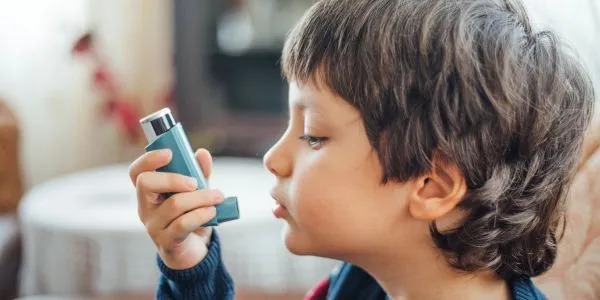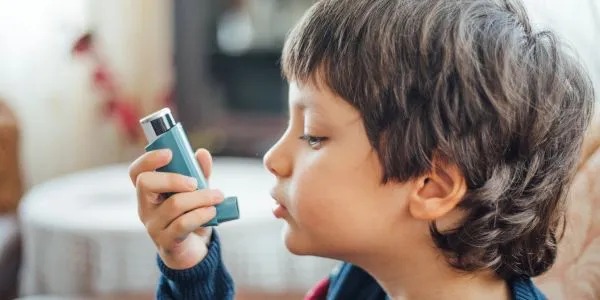Understanding Asthma in Children: Causes and Triggers
Childhood asthma is a chronic airway inflammation causing wheezing, breathlessness, chest tightness, and coughing. Though the exact cause is unknown, genetics, environment, and immune responses all play a role.

Children’s airways are naturally smaller than adults’, making them more vulnerable to asthma symptoms. When exposed to triggers, these airways become inflamed, produce excess mucus, and the surrounding muscles tighten, causing the characteristic narrowing that makes breathing difficult.
Common childhood asthma triggers in Ghaziabad include:
- Air pollution from vehicles and industries
- Seasonal changes and weather fluctuations
- Dust mites and cockroach allergens
- Pet dander
- Mold spores
- Respiratory infections
- Physical activity
- Strong emotions or stress
Identifying triggers is key to asthma control. A specialist can find your child’s specific triggers through history and tests for better prevention.
Daily Challenges for Children with Asthma
Children with asthma may struggle daily, affecting their growth and well-being.
Physical Limitations
Many children with asthma experience limitations in physical activities. Running, playing sports, or even laughing too hard can trigger symptoms. This can lead to:
- Reluctance to participate in physical education classes
- Self-imposed restrictions on play and exercise
- Decreased physical fitness
- Potential weight management issues
Effective asthma care includes safe physical activity to support healthy growth. With the right treatment plan from a specialist in respiratory medicine pulmonology, most children can participate in sports and exercise with appropriate precautions.
Emotional and Psychological Impact
The emotional toll of asthma on children shouldn’t be underestimated. Children may experience:
- Anxiety about having an asthma attack
- Embarrassment about using inhalers in front of peers
- Frustration over activity limitations
- Fear of being “different” from friends
- Stress from managing a chronic condition
These emotional challenges can affect a child’s self-esteem and social development. Parents should monitor emotional health and consult a doctor for any concerns.
Sleep Disruption
Nighttime asthma symptoms are common in children and can significantly disrupt sleep patterns. Poor sleep quality affects:
- Cognitive function and learning ability
- Mood regulation
- Growth and development
- Overall health and immune function
An experienced asthma specialist doctor can develop strategies to minimize nighttime symptoms, ensuring better sleep for both children and their often-exhausted parents.
What Parents Should Know About Asthma in Children
Quality pediatric asthma care involves a comprehensive approach that goes beyond simply prescribing medications. It needs regular review, education, and treatment updates as the child grows.
Personalized Treatment Plans
Every child with asthma is unique, with different triggers, symptom patterns, and responses to treatment. Specialized pediatric asthma care includes:
- Individualized medication regimens
- Age-appropriate delivery devices
- Trigger avoidance strategies
- Action plans for symptom management
- Regular monitoring and adjustment
Dr. Siddharth Anand at Avee Hospital develops personalized treatment plans that consider the whole child, including their age, activity level, environmental exposures, and family circumstances.
Education and Self-Management
As children grow, they gradually take more responsibility for managing their asthma. Effective pediatric asthma care includes age-appropriate education for both children and their families about:
- Proper use of medications and devices
- Recognition of early warning signs
- When and how to use rescue medications
- When to seek emergency care
- How to communicate about asthma with teachers and caregivers
Teaching kids about their condition builds confidence and helps them manage their health independently.
Recognizing Children Asthma Symptoms: Early Warning Signs
Children don’t always present with the “classic” asthma symptoms that adults experience. Young children often struggle to describe symptoms, making it harder for caregivers to recognize asthma.
Common Symptoms in Children
Children asthma symptoms may include:
- Persistent coughing, especially at night or early morning
- Wheezing or whistling sound when breathing
- Shortness of breath or rapid breathing
- Chest tightness or complaints of “chest hurting”
- Fatigue or decreased energy
- Difficulty keeping up with peers during play
- Frequent respiratory infections
Warning Signs of an Asthma Attack
Watch for signs like frequent cough, wheezing, shortness of breath, or chest tightness:
- Increased coughing, especially at night
- Difficulty speaking in complete sentences
- Visible retractions (skin pulling in between ribs during breathing)
- Bluish tint to lips or fingernails
- Anxiety or restlessness
- Hunched shoulders or unusual posture
- Flared nostrils during breathing
If these warning signs appear, parents should follow their child’s asthma action plan or Contact Avee Hospital immediately for guidance.
How Specialists Help Children Manage Asthma
Pulmonologists offer expert care for kids with asthma, focusing on accurate diagnosis, treatment, and long-term management:
Advanced Diagnostic Capabilities
Experts in respiratory medicine pulmonology use specialized tools to accurately diagnose and assess asthma severity:
- Pulmonary function testing modified for children
- Exhaled nitric oxide measurement
- Allergy testing
- Exercise challenge testing
- Imaging studies when needed
These diagnostic capabilities allow for more precise treatment planning and monitoring of the condition over time.
Comprehensive Treatment Approaches
Pulmonologists take a comprehensive approach to asthma management, considering:
- Pharmacological interventions (controller and rescue medications)
- Non-pharmacological strategies (environmental modifications)
- Comorbid conditions that may worsen asthma
- Nutritional factors
- Psychological aspects of chronic disease management
A holistic approach addresses all asthma triggers, improving control and overall outcomes.
Effective Asthma Management for Kids: Daily Strategies
Successful asthma management for kids requires consistent daily attention to several key areas:
Medication Adherence
Regular use of prescribed controller medications is essential for preventing asthma symptoms and attacks. Parents can help by:
- Establishing medication routines
- Using reminder systems
- Ensuring proper technique with inhalers or nebulizers
- Keeping rescue medications readily available
- Maintaining an adequate supply of all medications
An asthma specialist doctor can recommend the most appropriate medications and delivery devices for your child’s specific needs.
Environmental Control
Creating an asthma-friendly home environment helps reduce exposure to triggers:
- Using allergen-proof covers on mattresses and pillows
- Washing bedding weekly in hot water
- Reducing dust-collecting items like stuffed toys
- Controlling humidity to prevent mold growth
- Avoiding strong cleaning products and fragrances
- Maintaining good ventilation
- Keeping pets out of the child’s bedroom
In Ghaziabad, where air pollution can be a significant trigger, additional measures like air purifiers and limiting outdoor activities during high pollution days may be necessary.
School Management
Children spend a significant portion of their day at school, making school-based asthma management crucial:
- Providing an asthma action plan to school staff
- Ensuring rescue medications are accessible
- Educating teachers about asthma and school performance connections
- Addressing potential triggers in the classroom
- Planning for physical education and recess activities
Open communication between parents, healthcare providers, and school personnel creates a supportive environment for children with asthma.
The Impact of Asthma and School Performance: What Teachers Should Know
Research shows a direct link between uncontrolled asthma and school performance in children of all ages. Asthma can affect academic achievement through:
Attendance Issues
Children with poorly controlled asthma miss more school days due to:
- Asthma attacks requiring medical attention
- Doctor appointments
- Recovery from nighttime symptoms
- Hospitalization for severe exacerbations
These absences can lead to gaps in learning and difficulty keeping up with coursework.
Cognitive Effects
Even when present in school, children with asthma may experience:
- Fatigue from disrupted sleep
- Difficulty concentrating due to symptoms
- Side effects from medications
- Anxiety about potential symptoms
Teachers who understand these challenges can provide appropriate accommodations and support.
Participation Limitations
Asthma may limit a child’s ability to fully participate in:
- Physical education classes
- Field trips
- Extracurricular activities
- Social interactions
These limitations can affect both academic performance and social development.
When to Seek Medical Help for Your Child’s Asthma
Parents should Contact Avee Hospital in the following situations:
For Initial Evaluation
If your child shows signs of asthma, early evaluation by a specialist is important. Contact Avee Hospital when your child experiences:
- Recurrent wheezing episodes
- Persistent cough, especially at night
- Shortness of breath during normal activities
- Chest tightness or discomfort
- Symptoms that interfere with sleep, play, or school
Early action helps stop symptoms from worsening and avoids complications.
For Ongoing Management
Regular follow-ups are key for managing childhood asthma. Contact Avee Hospital to book an appointment:
- Routine monitoring visits
- Medication adjustments as your child grows
- Pulmonary function testing
- Review and updates to asthma action plans
- Seasonal management strategies
For Emergency Situations
Some situations require immediate medical attention. Contact Avee Hospital or seek emergency care if your child experiences:
- Severe breathing difficulty
- Inability to speak in complete sentences
- No improvement after using rescue medication
- Bluish coloration of lips or fingernails
- Severe chest retractions
- Confusion or decreased alertness
Prompt treatment of severe asthma episodes is critical to prevent serious complications.
How Asthma Affects Overall Health in Kids
Parents of children with asthma often have General Health Concerns beyond the respiratory symptoms themselves. These may include:
Medication Safety
It’s important to know that asthma medications are generally safe and help prevent long-term lung damage when used correctly:
- The risks of uncontrolled asthma typically outweigh medication side effects
- Modern asthma medications have excellent safety profiles
- Proper technique minimizes systemic absorption and side effects
- Regular monitoring helps catch problems early for timely treatment
Dr. Siddharth Anand takes time to address these General Health Concerns, explaining the benefits and risks of each treatment option.
Growth and Development
Some parents worry that asthma or its treatments might affect their child’s growth. Research shows that:
- Well-controlled asthma has minimal impact on growth
- Modern inhaled corticosteroids at appropriate doses have minimal growth effects
- Poorly controlled asthma can potentially affect growth more than medications
- Regular monitoring of height and weight is part of comprehensive asthma care
Long-term Prognosis
Parents naturally wonder about their child’s future with asthma:
- Many children experience improvement in symptoms as they grow
- Some may “outgrow” their asthma entirely
- Others will need ongoing management into adulthood
- Early and effective treatment improves long-term outcomes
At Avee Hospital, these discussions are an important part of the comprehensive care provided to families.
How to Choose the Right Care for Your Child’s Asthma
When seeking care for a child with asthma, finding the right specialist makes a significant difference in outcomes. An ideal asthma specialist doctor should have:
- Specialized training in pediatric respiratory medicine
- Experience treating children of various ages
- A child-friendly approach to care
- Excellent communication skills
- Willingness to partner with parents
- Accessibility for questions and concerns
- Comprehensive approach to treatment
At Avee Hospital, Dr. Siddharth Anand offers expert care for children with asthma and respiratory issues.
Conclusion: Empowering Children to Thrive Despite Asthma
While asthma presents significant challenges for children, with proper care and management, these challenges can be overcome. The goal of treatment is not just symptom control but enabling children to participate fully in all aspects of childhood—playing, learning, growing, and developing normally despite their condition.
With advances in understanding and treating pediatric asthma, children today have better outcomes than ever before. The key is early diagnosis, specialized care, and consistent management. By partnering with an experienced asthma specialist doctor and following a comprehensive treatment plan, families can help their children lead healthy, active lives.If your child shows signs of asthma or struggles with existing asthma symptoms, Contact Avee Hospital to schedule a consultation. Located in Vaishali, Ghaziabad, Avee Hospital offers specialized pediatric asthma care under the expert guidance of Dr. Siddharth Anand. With the right care team, your child can overcome the challenges of asthma and thrive.


